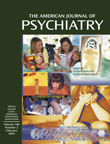Are Top Journals Biased Against Eating Disorders Topics?
Abstract
OBJECTIVE: This study investigated whether there is a bias against eating disorders research among the leading psychiatric, psychological, and medical journals. METHOD: The authors performed a comparison between the number of empirical articles published about anorexia nervosa and/or bulimia nervosa and the number of articles published about panic disorder and/or agoraphobia (i.e., disorders of comparable disease burden) in 29 high-impact journals over a 5-year period (1996–2001). RESULTS: There were almost twice as many published empirical articles about panic disorder and/or agoraphobia (N=365) as there were about anorexia nervosa and/or bulimia nervosa (N=169). CONCLUSIONS: The findings indicate a possible bias against eating disorders research among some leading psychiatric journals. Alternative explanations and implications are discussed.



